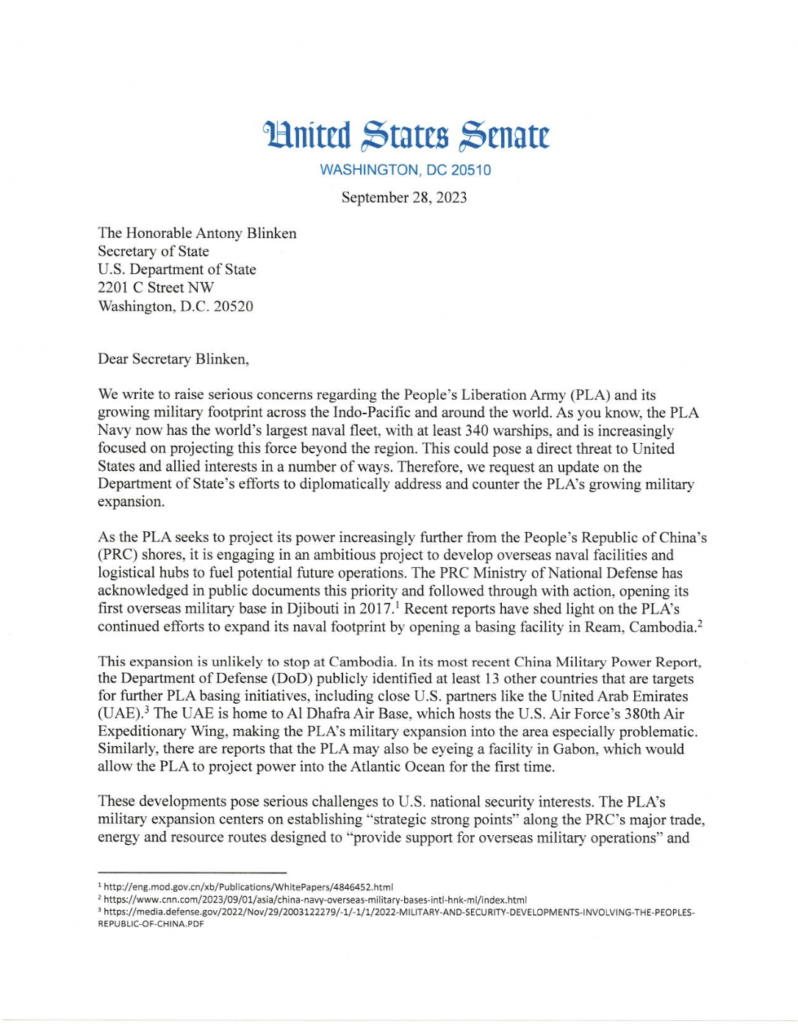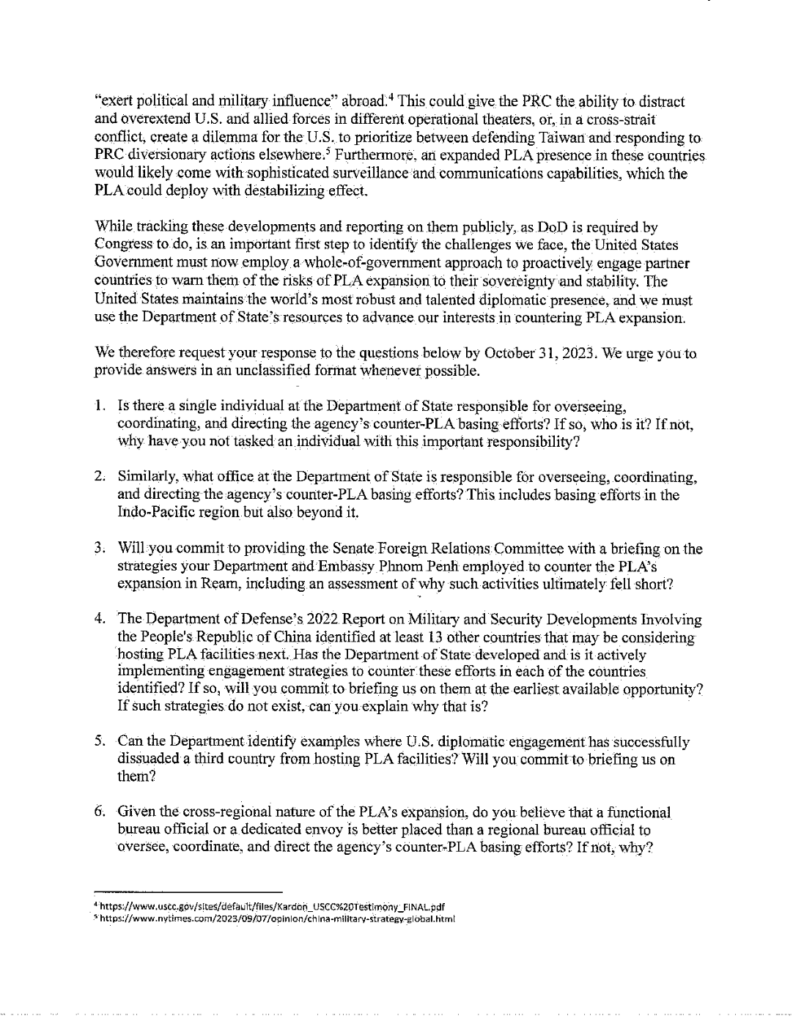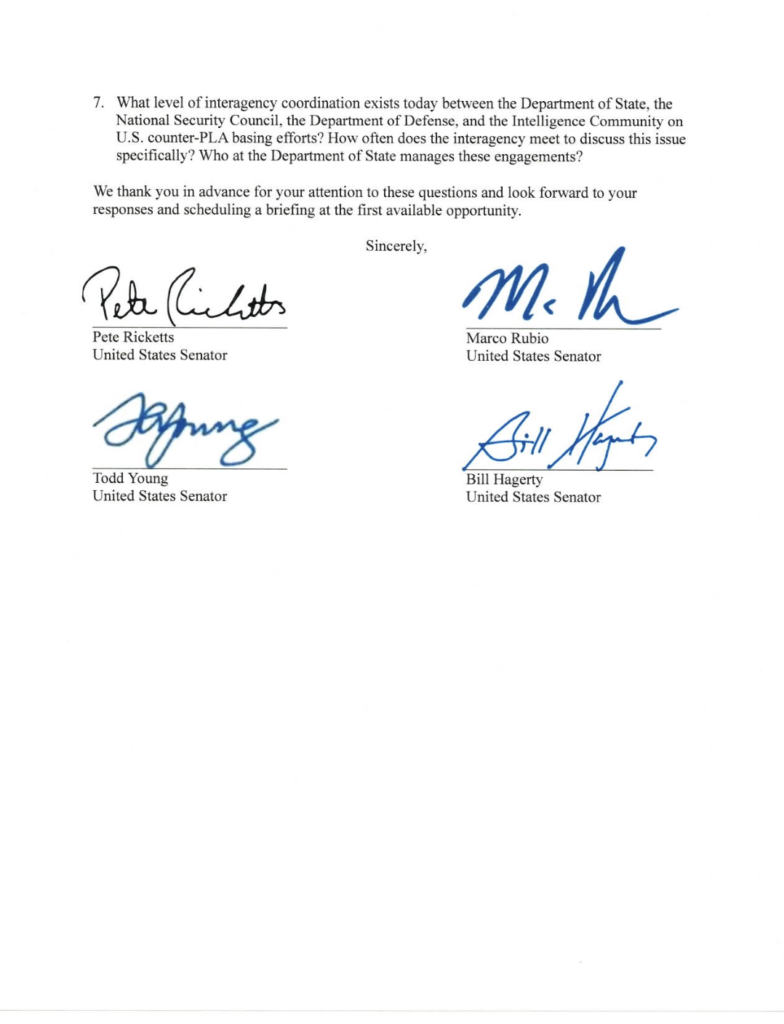Ricketts Leads Call for State Department to Step Up Efforts to Combat CCP’s Growing Military Footprint
September 29, 2023
WASHINGTON, D.C. – Today, U.S. Senators Pete Ricketts (R-NE), Marco Rubio (R-FL), Todd Young (R-IN), and Bill Hagerty (R-TN) called on President Biden’s Department of State to step up efforts to combat the Chinese Communist Party’s growing military footprint around the world.
The senators, who all serve on the Senate Committee on Foreign Relations, outlined how the CCP’s “ambitious project to develop overseas naval facilities and logistical hubs to fuel potential future operations” threatens U.S. national security interests. The senators called for a “whole-of-government” approach and asked Secretary of State Antony Blinken to explain how the Department of State was working to advance American diplomatic interests on this topic.
“We write to raise serious concerns regarding the People’s Liberation Army (PLA) and its growing military footprint across the Indo-Pacific and around the world,” the senators wrote. “As you know, the PLA Navy now has the world’s largest naval fleet, with at least 340 warships, and is increasingly focused on projecting this force beyond the region. This could pose a direct threat to United States and allied interests in a number of ways. Therefore, we request an update on the Department of State’s efforts to diplomatically address and counter the PLA’s growing military expansion.”
“While tracking these developments and reporting on them publicly, as DoD is required by Congress to do, is an important first step to identify the challenges we face, the United States Government must now employ a whole-of-government approach to proactively engage partner countries to warn them of the risks of PLA expansion to their sovereignty and stability,” the senators continued. “The United States maintains the world’s most robust and talented diplomatic presence, and we must use the Department of State’s resources to advance our interests in countering PLA expansion.”



PDF link here
Full text of the letter can be found below:
Dear Secretary Blinken,
We write to raise serious concerns regarding the People’s Liberation Army (PLA) and its growing military footprint across the Indo-Pacific and around the world. As you know, the PLA Navy now has the world’s largest naval fleet, with at least 340 warships, and is increasingly focused on projecting this force beyond the region. This could pose a direct threat to United States and allied interests in a number of ways. Therefore, we request an update on the Department of State’s efforts to diplomatically address and counter the PLA’s growing military expansion.
As the PLA seeks to project its power increasingly further from the People’s Republic of China’s (PRC) shores, it is engaging in an ambitious project to develop overseas naval facilities and logistical hubs to fuel potential future operations. The PRC Ministry of National Defense has acknowledged in public documents this priority and followed through with action, opening its first overseas military base in Djibouti in 2017.[1] Recent reports have shed light on the PLA’s continued efforts to expand its naval footprint by opening a basing facility in Ream, Cambodia.[2]
This expansion is unlikely to stop at Cambodia. In its most recent China Military Power Report, the Department of Defense (DoD) publicly identified at least 13 other countries that are targets for further PLA basing initiatives, including close U.S. partners like the United Arab Emirates (UAE).[3] The UAE is home to Al Dhafra Air Base, which hosts the U.S. Air Force’s 380th Air Expeditionary Wing, making the PLA’s military expansion into the area especially problematic. Similarly, there are reports that the PLA may also be eyeing a facility in Gabon, which would allow the PLA to project power into the Atlantic Ocean for the first time.
These developments pose serious challenges to U.S. national security interests. The PLA’s military expansion centers on establishing “strategic strong points” along the PRC’s major trade, energy and resource routes designed to “provide support for overseas military operations” and “exert political and military influence” abroad.[4] This could give the PRC the ability to distract and overextend U.S. and allied forces in different operational theaters, or, in a cross-strait conflict, create a dilemma for the U.S. to prioritize between defending Taiwan and responding to PRC diversionary actions elsewhere.[5]Furthermore, an expanded PLA presence in these countries would likely come with sophisticated surveillance and communications capabilities, which the PLA could deploy with destabilizing effect.
While tracking these developments and reporting on them publicly, as DoD is required by Congress to do, is an important first step to identify the challenges we face, the United States Government must now employ a whole-of-government approach to proactively engage partner countries to warn them of the risks of PLA expansion to their sovereignty and stability. The United States maintains the world’s most robust and talented diplomatic presence, and we must use the Department of State’s resources to advance our interests in countering PLA expansion.
We therefore request your response to the questions below by October 31, 2023. We urge you to provide answers in an unclassified format whenever possible.
- Is there a single individual at the Department of State responsible for overseeing, coordinating, and directing the agency’s counter-PLA basing efforts? If so, who is it? If not, why have you not tasked an individual with this important responsibility?
- Similarly, what office at the Department of State is responsible for overseeing, coordinating, and directing the agency’s counter-PLA basing efforts? This includes basing efforts in the Indo-Pacific region but also beyond it.
- Will you commit to providing the Senate Foreign Relations Committee with a briefing on the strategies your Department and Embassy Phnom Penh employed to counter the PLA’s expansion in Ream, including an assessment of why such activities ultimately fell short?
- The Department of Defense’s 2022 Report on Military and Security Developments Involving the People’s Republic of China identified at least 13 other countries that may be considering hosting PLA facilities next. Has the Department of State developed and is it actively implementing engagement strategies to counter these efforts in each of the countries identified? If so, will you commit to briefing us on them at the earliest available opportunity? If such strategies do not exist, can you explain why that is?
- Can the Department identify examples where U.S. diplomatic engagement has successfully dissuaded a third country from hosting PLA facilities? Will you commit to briefing us on them?
- Given the cross-regional nature of the PLA’s expansion, do you believe that a functional bureau official or a dedicated envoy is better placed than a regional bureau official to oversee, coordinate, and direct the agency’s counter-PLA basing efforts? If not, why?
- What level of interagency coordination exists today between the Department of State, the National Security Council, the Department of Defense, and the Intelligence Community on U.S. counter-PLA basing efforts? How often does the interagency meet to discuss this issue specifically? Who at the Department of State manages these engagements?
We thank you in advance for your attention to these questions and look forward to your responses and scheduling a briefing at the first available opportunity.
Sincerely,
Pete Ricketts
Marco Rubio
Todd Young
Bill Hagerty